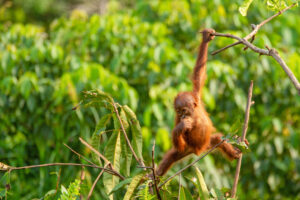People often associate elephants with emotion. Elephants reach out their trunks to other elephants who are distressed, help those who are injured, and appear to mourn their dead. They are also one of the few animals able to recognize their own reflection. A new study suggests that these traits could be caused by the gentle giants “self-domesticating.”
A natural adaptation?
Self-domestication is a term to describe wild animals that develop attributes that we associate with domesticated creatures, without selective breeding by humans. Self-domesticated animals include humans and bonobos.
The theory of self-domestication is based on a hypothesis about how we evolved. PIt suggests that natural selection favored humans who were more sociable and cooperative, and therefore less aggressive.
Over the last 80,000 years, we have developed softer features, and we are more expressive with our faces. Our behavior is more communicative, we are capable of sharing ideas, and we tend to avoid aggressive individuals.

Photo: Shutterstock
Selective breeding
Some animals share these characteristics because we have intentionally domesticated them. Our pet cats and dogs descended from wild counterparts, but we have bred them to produce the qualities we want. Ultimately, we create the perfect companion to take on walks or curl up on our lap. It is incredibly rare for this to happen without human interference.
Yet there is at least one example. Bonobos are much less aggressive than the closely related chimpanzee. They have rounded faces and natural selection has weeded out aggressive males. Previously, some researchers have argued that they may be the only other animal to self-domesticate.

Chimpanzees. Photo: Shutterstock
Large enough to free the mind
Researchers compared elephants to both humans and bonobos and identified 19 traits that could signify self-regulation. All three species have shorter jaw bones than their ancestors, are playful and sociable, and have long childhoods. Elephants are also empathetic, spend a long time helping their offspring develop, and will babysit for others in the group. Another telltale sign is that they seem able to stop themselves from being aggressive.
Another reason the researchers believe elephants could be added to the select group of self-domesticating species is their communication skills. Elephants use a range of vocal cues and have different alarm calls for different situations. They can also pass on knowledge to each other. In many species, information such as what to eat and how seems innate. Offspring fend for themselves from birth or after a few days. But elephant calves stay with their mothers for years while they learn to survive.

Photo: Shutterstock
Limor Raviv, who led the elephant study, suggests that these key characteristics could be a result of their size. Because elephants are so large and strong, “elephants are generally less worried about evading or fighting other animals for their survival. This kind of safe environment could relax selective pressures for aggression, free cognitive resources, and open up more opportunities for exploration, communication, and play,” Raviv explained.






